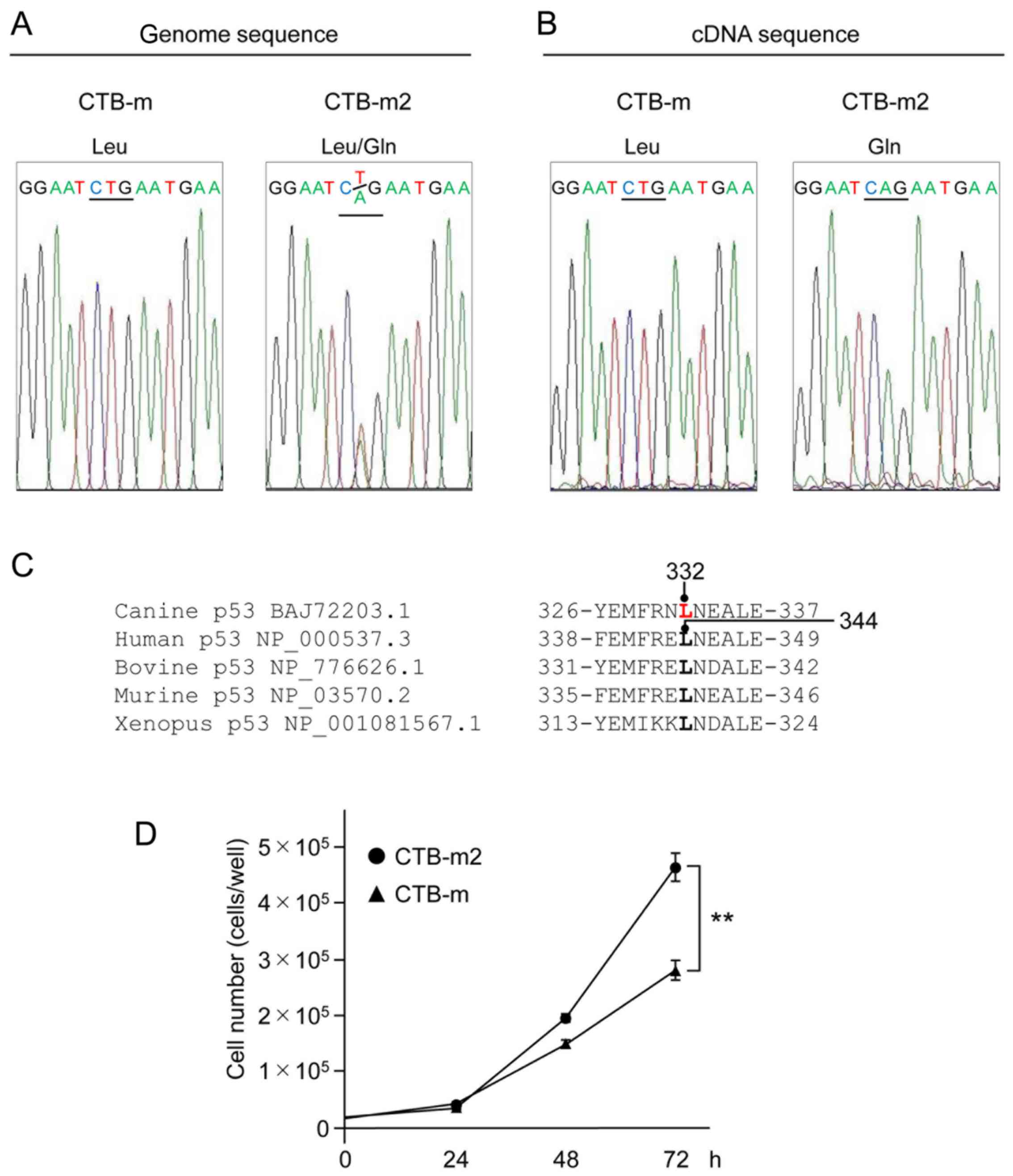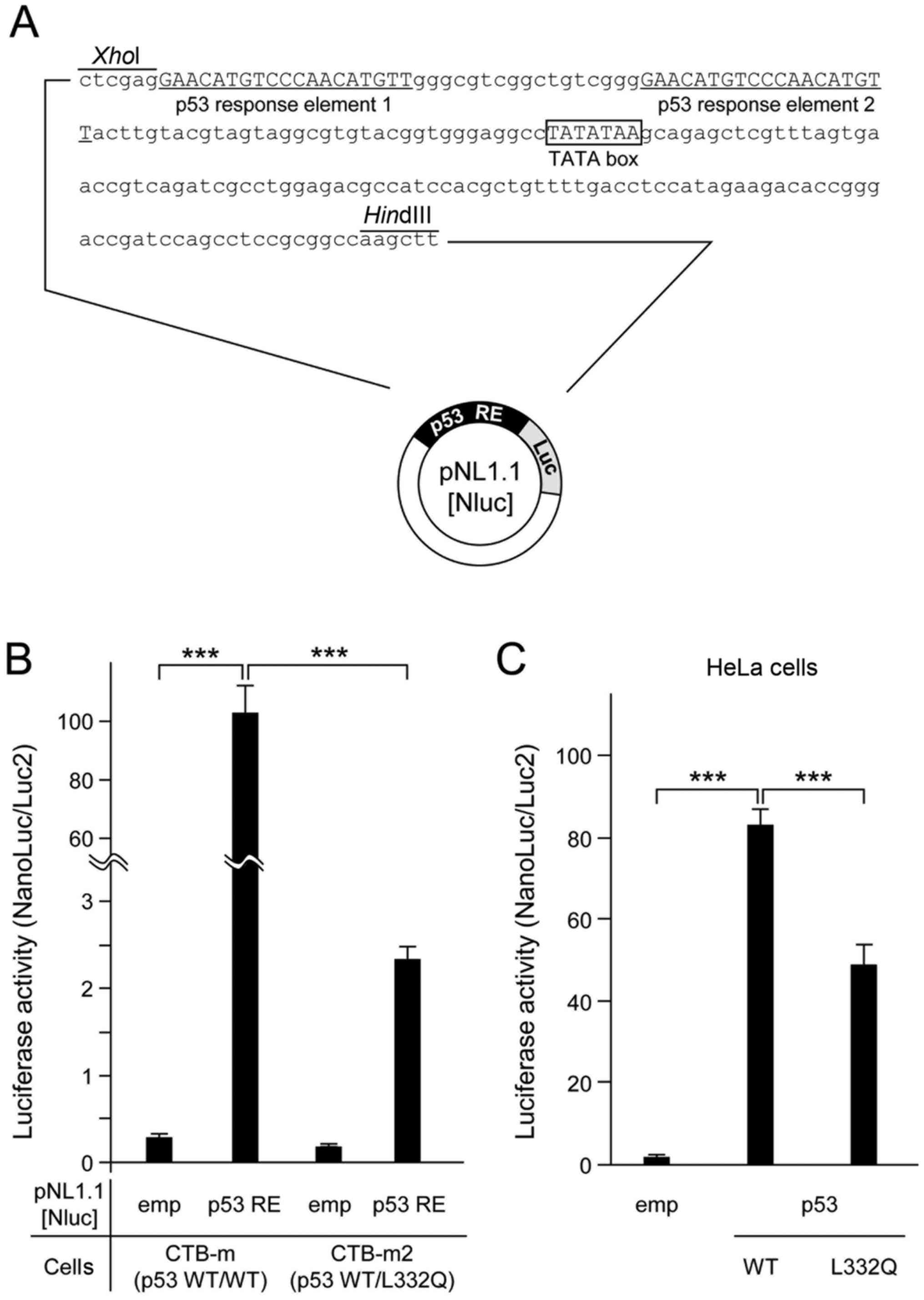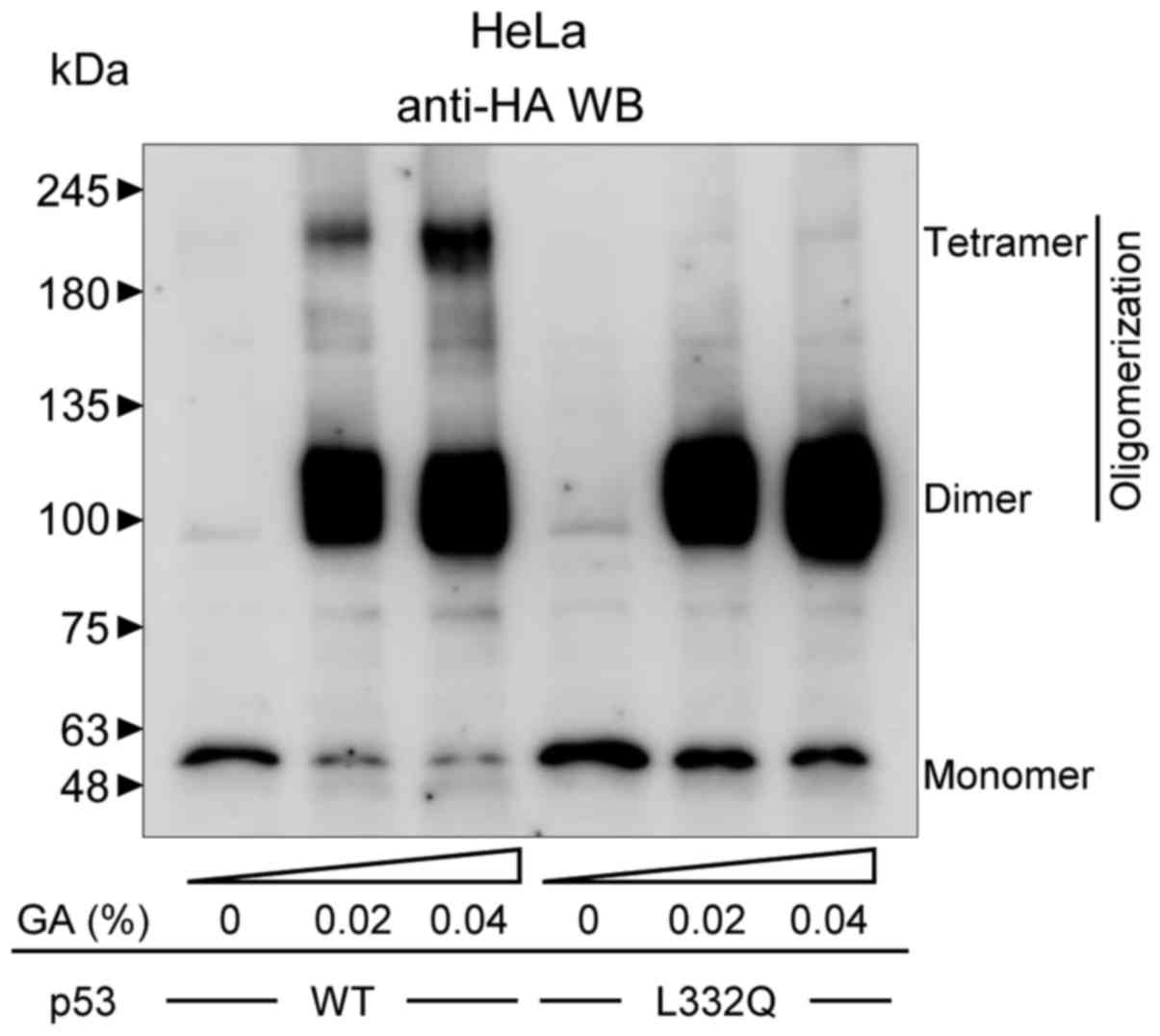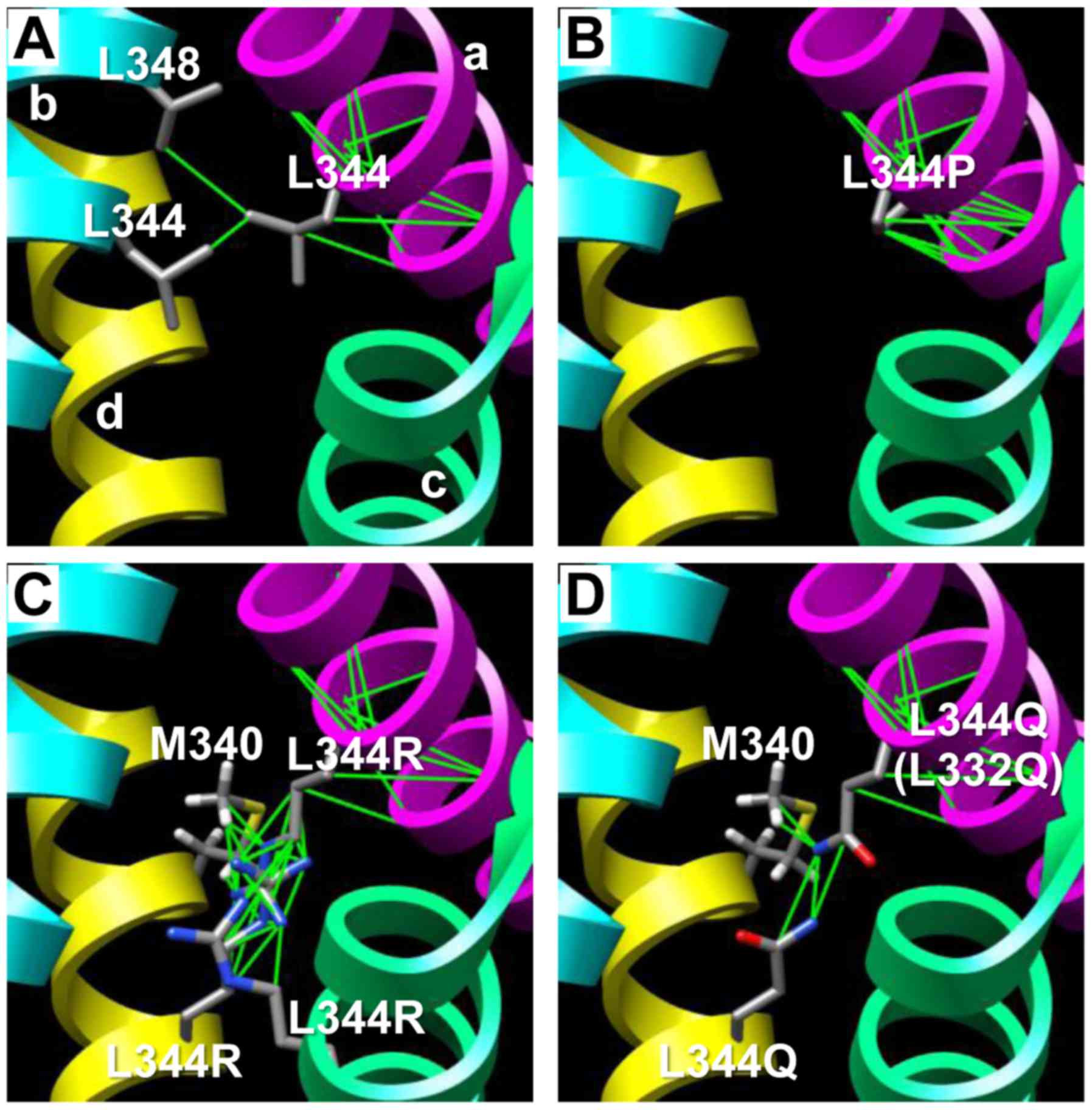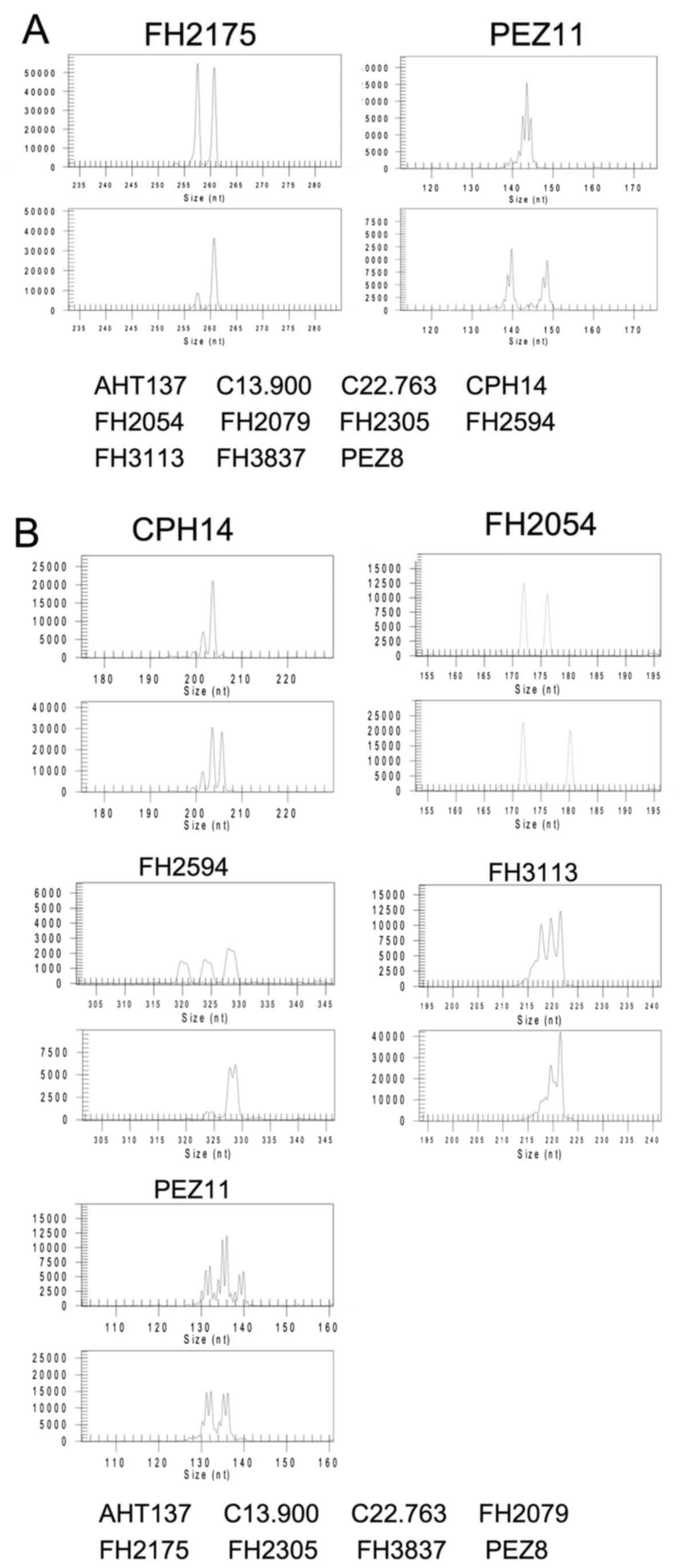|
1
|
Meek DW: Tumour suppression by p53: A role
for the DNA damage response? Nat Rev Cancer. 9:714–723. 2009.
View Article : Google Scholar : PubMed/NCBI
|
|
2
|
Lane D and Levine A: p53 Research: The
past thirty years and the next thirty years. Cold Spring Harb
Perspect Biol. 2:a0008932010. View Article : Google Scholar : PubMed/NCBI
|
|
3
|
Bieging KT, Mello SS and Attardi LD:
Unravelling mechanisms of p53-mediated tumour suppression. Nat Rev
Cancer. 14:359–370. 2014. View
Article : Google Scholar : PubMed/NCBI
|
|
4
|
Petitjean A, Mathe E, Kato S, Ishioka C,
Tavtigian SV, Hainaut P and Olivier M: Impact of mutant p53
functional properties on TP53 mutation patterns and tumor
phenotype: Lessons from recent developments in the IARC TP53
database. Hum Mutat. 28:622–629. 2007. View Article : Google Scholar : PubMed/NCBI
|
|
5
|
Olivier M, Hollstein M and Hainaut P: TP53
mutations in human cancers: Origins, consequences, and clinical
use. Cold Spring Harb Perspect Biol. 2:a0010082010. View Article : Google Scholar : PubMed/NCBI
|
|
6
|
Joerger AC and Fersht AR: Structural
biology of the tumor suppressor p53. Annu Rev Biochem. 77:557–582.
2008. View Article : Google Scholar : PubMed/NCBI
|
|
7
|
Rajagopalan S, Huang F and Fersht AR:
Single-molecule characterization of oligomerization kinetics and
equilibria of the tumor suppressor p53. Nucleic Acids Res.
39:2294–2303. 2011. View Article : Google Scholar : PubMed/NCBI
|
|
8
|
Jeffrey PD, Gorina S and Pavletich NP:
Crystal structure of the tetramerization domain of the p53 tumor
suppressor at 1.7 angstroms. Science. 267:1498–1502. 1995.
View Article : Google Scholar : PubMed/NCBI
|
|
9
|
Kamada R, Toguchi Y, Nomura T, Imagawa T
and Sakaguchi K: Tetramer formation of tumor suppressor protein
p53: Structure, function, and applications. Biopolymers.
106:598–612. 2016. View Article : Google Scholar : PubMed/NCBI
|
|
10
|
Mateu MG and Fersht AR: Nine hydrophobic
side chains are key determinants of the thermodynamic stability and
oligomerization status of tumour suppressor p53 tetramerization
domain. EMBO J. 17:2748–2758. 1998. View Article : Google Scholar : PubMed/NCBI
|
|
11
|
Kamada R, Nomura T, Anderson CW and
Sakaguchi K: Cancer-associated p53 tetramerization domain mutants:
Quantitative analysis reveals a low threshold for tumor suppressor
inactivation. J Biol Chem. 286:252–258. 2011. View Article : Google Scholar : PubMed/NCBI
|
|
12
|
Varley JM, Thorncroft M, McGown G, Tricker
K, Birch JM and Evans DG: A novel deletion within exon 6 of TP53 in
a family with Li-Fraumeni-like syndrome, and LOH in a benign lesion
from a mutation carrier. Cancer Genet Cytogenet. 90:14–16. 1996.
View Article : Google Scholar : PubMed/NCBI
|
|
13
|
Atema A and Chène P: The gain of function
of the p53 mutant Asp281Gly is dependent on its ability to form
tetramers. Cancer Lett. 185:103–109. 2002. View Article : Google Scholar : PubMed/NCBI
|
|
14
|
Muller PA and Vousden KH: Mutant p53 in
cancer: New functions and therapeutic opportunities. Cancer Cell.
25:304–317. 2014. View Article : Google Scholar : PubMed/NCBI
|
|
15
|
Uyama R, Nakagawa T, Hong SH, Mochizuki M,
Nishimura R and Sasaki N: Establishment of four pairs of canine
mammary tumour cell lines derived from primary and metastatic
origin and their E-cadherin expression. Vet Comp Oncol. 4:104–113.
2006. View Article : Google Scholar : PubMed/NCBI
|
|
16
|
Kato Y, Ochiai K, Kawakami S, Nakao N,
Azakami D, Bonkobara M, Michishita M, Morimatsu M, Watanabe M and
Omi T: Canine REIC/Dkk-3 interacts with SGTA and restores androgen
receptor signalling in androgen-independent prostate cancer cell
lines. BMC Vet Res. 13:1702017. View Article : Google Scholar : PubMed/NCBI
|
|
17
|
Imagawa T, Terai T, Yamada Y, Kamada R and
Sakaguchi K: Evaluation of transcriptional activity of p53 in
individual living mammalian cells. Anal Biochem. 387:249–256. 2009.
View Article : Google Scholar : PubMed/NCBI
|
|
18
|
Cubillos-Rojas M, Schneider T,
Sánchez-Tena S, Bartrons R, Ventura F and Rosa JL: Tris-acetate
polyacrylamide gradient gel electrophoresis for the analysis of
protein oligomerization. Anal Bioanal Chem. 408:1715–1719. 2016.
View Article : Google Scholar : PubMed/NCBI
|
|
19
|
Pettersen EF, Goddard TD, Huang CC, Couch
GS, Greenblatt DM, Meng EC and Ferrin TE: UCSF Chimera - a
visualization system for exploratory research and analysis. J
Comput Chem. 25:1605–1612. 2004. View Article : Google Scholar : PubMed/NCBI
|
|
20
|
Salvatella X, Martinell M, Gairí M, Mateu
MG, Feliz M, Hamilton AD, De Mendoza J and Giralt E: A
tetraguanidinium ligand binds to the surface of the tetramerization
domain of protein P53. Angew Chem Int Ed Engl. 43:196–198. 2004.
View Article : Google Scholar : PubMed/NCBI
|
|
21
|
Martinell M, Salvatella X,
Fernández-Carneado J, Gordo S, Feliz M, Menéndez M and Giralt E:
Synthetic ligands able to interact with the p53 tetramerization
domain. Towards understanding a protein surface recognition event.
ChemBioChem. 7:1105–1113. 2006. View Article : Google Scholar : PubMed/NCBI
|
|
22
|
Gordo S, Martos V, Santos E, Menéndez M,
Bo C, Giralt E and de Mendoza J: Stability and structural recovery
of the tetramerization domain of p53-R337H mutant induced by a
designed templating ligand. Proc Natl Acad Sci USA.
105:16426–16431. 2008. View Article : Google Scholar : PubMed/NCBI
|
|
23
|
Osaki S, Nakanishi Y, Takayama K, Pei XH,
Ueno H and Hara N: Alteration of drug chemosensitivity caused by
the adenovirus-mediated transfer of the wild-type p53 gene in human
lung cancer cells. Cancer Gene Ther. 7:300–307. 2000. View Article : Google Scholar : PubMed/NCBI
|
|
24
|
Yoshikawa K, Hamada J, Tada M, Kameyama T,
Nakagawa K, Suzuki Y, Ikawa M, Hassan NM, Kitagawa Y and Moriuchi
T: Mutant p53 R248Q but not R248W enhances in vitro invasiveness of
human lung cancer NCI-H1299 cells. Biomed Res. 31:401–411. 2010.
View Article : Google Scholar : PubMed/NCBI
|
|
25
|
Tornaletti S and Pfeifer GP: Complete and
tissue-independent methylation of CpG sites in the p53 gene:
Implications for mutations in human cancers. Oncogene.
10:1493–1499. 1995.PubMed/NCBI
|
|
26
|
Soussi T and Lozano G: p53 mutation
heterogeneity in cancer. Biochem Biophys Res Commun. 331:834–842.
2005. View Article : Google Scholar : PubMed/NCBI
|
|
27
|
Lin C, Liang Y, Zhu H, Zhang J and Zhong
X: R280T mutation of p53 gene promotes proliferation of human
glioma cells through GSK-3β/PTEN pathway. Neurosci Lett. 529:60–65.
2012. View Article : Google Scholar : PubMed/NCBI
|
|
28
|
Retzlaff M, Rohrberg J, Küpper NJ,
Lagleder S, Bepperling A, Manzenrieder F, Peschek J, Kessler H and
Buchner J: The regulatory domain stabilizes the p53 tetramer by
intersubunit contacts with the DNA binding domain. J Mol Biol.
425:144–155. 2013. View Article : Google Scholar : PubMed/NCBI
|
|
29
|
Joerger AC and Fersht AR: The p53 Pathway:
Origins, inactivation in cancer, and emerging therapeutic
approaches. Annu Rev Biochem. 85:375–404. 2016. View Article : Google Scholar : PubMed/NCBI
|















